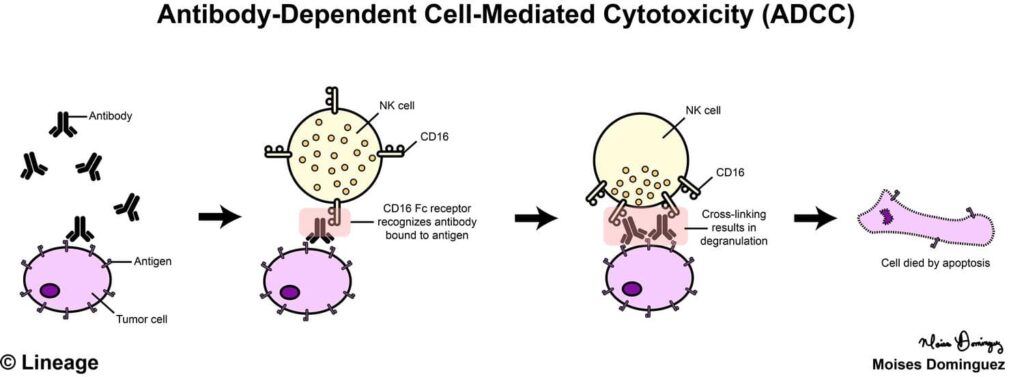Overview

Introduction (Antibody-Dependent Cell-Mediated Cytotoxicity)
Antibody-Dependent Cell-Mediated Cytotoxicity (ADCC) is a vital immune mechanism that plays a crucial role in defending the body against infected or abnormal cells. ADCC involves the cooperation of antibodies and immune cells to target and eliminate target cells. Understanding ADCC is essential for medical professionals, especially those in immunology, oncology, and infectious diseases. This article provides a comprehensive overview of ADCC, including its types, function, related studies, treatment considerations, and clinical significance.
- Antibody dependent cell mediated cytotoxicity (ADCC) is a cooperative response involving
- binding of antibodies produced by B-cells to antigens
- recognition of the constant fragment (Fc) by effector cells
- release of damaging substances by effector cells
- destruction of the pathogenic organism
- Antibody-Dependent Cell-Mediated Cytotoxicity is an interaction between innate and adaptive immunity that is important because
- it allows innate immune effectors to recognize pathogens that
- do not express pathogen associated molecular patterns (PAMPs)
- hide these patterns from innate immune detection
- otherwise subvert innate immune function
- it allows innate immune effectors to recognize pathogens that
- it composes a big part of the immune response to parasites
Activation
- ADCC is activated by
- specific binding of circulating antibodies to antigens using
- recruitment of immune cells by the constant fragment (Fc) of the antibody including
- granulocytes such as
- neutrophils
- monocytes
- eosinophils
- other cells such as
- macrophages
- natural killer cells
- granulocytes such as
- ADCC is an adaptation of innate immune functions by the adaptive immune system
- The specificity of ADCC is determined by the specificity of the antibody
Effector Mechanisms
After recognition of the coated pathogen a variety of cells are recruited to the pathogen
Cell Type
- General destruction of recognized pathogens
- Presentation of ingested antigens
- Release of lytic enzymes and toxic substances
Natural killer cells
- Detection of abnormal cells without MHC expression
- Anti-tumor cell immunity
- Release of granzyme and perforin proteins
Neutrophils
- Antibacterial immunity
- Release of lytic enzymes
- Generation of reactive oxygen species
Eosinophils
- Antiparasitic immunity
- Release of major basic protein and other toxic substances
Function of ADCC:
ADCC is a process by which immune cells, such as natural killer (NK) cells, recognize and eliminate target cells that are coated with antibodies. The process involves several steps:
- Antibody Binding: Antibodies specific to antigens on the surface of target cells bind to those antigens, forming immune complexes.
- NK Cell Activation: NK cells possess Fc receptors that can bind to the Fc portion of antibodies bound to target cells. This interaction triggers NK cell activation.
- Release of Cytotoxic Granules: Activated NK cells release cytotoxic granules containing perforin and granzymes, which induce cell death in the target cells.
Types of ADCC:
- Cellular ADCC: NK cells are the primary effectors in cellular ADCC. They recognize and eliminate antibody-coated target cells, such as virus-infected or cancerous cells.
- Humoral ADCC: In humoral ADCC, antibodies help clear antigens that are not directly recognized by immune cells. For example, Antibody-Dependent Cell-Mediated Cytotoxicity can aid in clearing pathogens covered with antibodies.
Clinical Significance:
- Cancer Immunotherapy: Antibody-Dependent Cell-Mediated Cytotoxicity is an important mechanism in cancer immunotherapy. Monoclonal antibodies are designed to bind to cancer cell antigens, enhancing NK cell-mediated killing of cancer cells.
- Infectious Diseases: ADCC contributes to the control of viral infections by facilitating the destruction of virus-infected cells.
ADCC Studies:
- Laboratory Studies: In vitro experiments assess ADCC activity using target cells, antibodies, and effector cells (such as NK cells). This helps researchers understand the effectiveness of antibodies in eliminating target cells.
- Clinical Trials: Clinical trials evaluate the efficacy of monoclonal antibody therapies that rely on ADCC for cancer treatment and management of infectious diseases.
Treatment Considerations:
- Cancer Immunotherapy: Monoclonal antibody therapies like rituximab, trastuzumab, and cetuximab are designed to trigger ADCC against cancer cells, enhancing the immune response against tumors.
- Infectious Diseases: Antibody-Dependent Cell-Mediated Cytotoxicity-inducing antibodies are investigated for their potential to enhance the immune response against viral infections, such as HIV and influenza.
Limitations and Future Directions:
- Antibody Selection: Antibody-dependent cell-mediated Cytotoxicity effectiveness depends on the specificity and affinity of antibodies, requiring careful selection in therapeutic applications.
- Resistance: Some viruses and tumors may develop resistance to ADCC by downregulating the target antigens or inhibiting the effector cell functions.
Conclusion
Antibody-dependent cell-mediated Cytotoxicity (ADCC) is a critical immune mechanism in which antibodies, immune cells like NK cells, and target cells collaborate to eliminate infected or abnormal cells. ADCC involves antibody binding, NK cell activation, and cytotoxic granule release. Cellular and humoral ADCC are two primary forms of this immune process. Antibody-dependent cell-mediated Cytotoxicity holds significant clinical relevance in cancer immunotherapy and the control of infectious diseases.
Clinical studies and trials investigate the efficacy of monoclonal antibody therapies that harness Antibody-Dependent Cell-Mediated Cytotoxicity to target cancer cells or combat viral infections. However, limitations and challenges, such as antibody selection and resistance mechanisms, necessitate ongoing research to refine ADCC-based treatments. Medical professionals must comprehend ADCC’s intricacies to harness its potential in developing innovative therapies for cancer and infectious diseases and improve patient outcomes.
Check out Ultimate USMLE Step 1 Study Notes.



